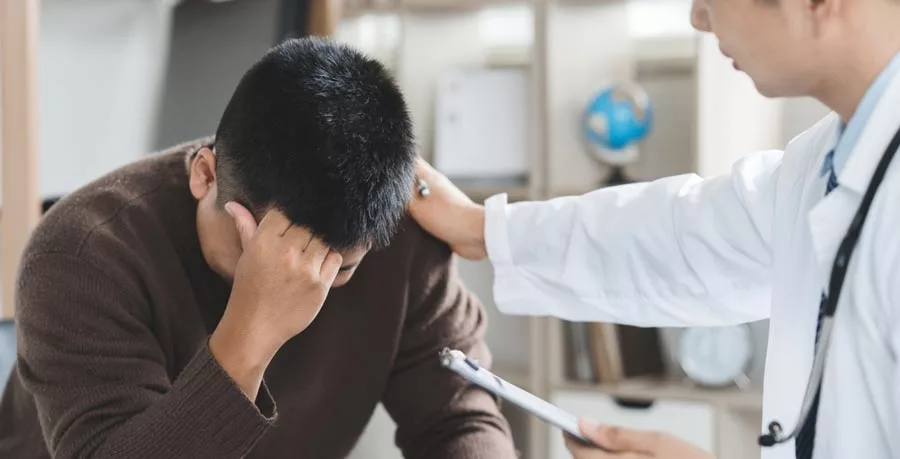Getting Treatment for a Troubled Loved: Involuntary Commitment Georgia
Helping someone with drug or alcohol addiction who refuses to go to rehab can be challenging, although not impossible. Ultimately, the final decision to seek help and attend therapy or a rehabilitation program has to come from the person with the addiction. However, if over time loved ones consistently support someone dealing with an addiction, they may be able to influence that person’s choice to check into rehab.
In this article, learn about involuntary commitment laws in Georgia and what they mean if you have a loved one who needs rehabilitation support, as well as tips for helping someone who’s suffering from substance abuse and is reluctant to change their destructive behavior.
Ingrained Recovery stands as a proven option for clients who need help, even those who are reluctant to seek treatment, and will stand beside you every step of the way in providing support for recovery!
How Can I Help Someone Who Refuses To Go To Rehab?

One of the hardest things someone can go through is attempting to help a loved one who’s experiencing an addiction when they don’t want to be helped or to change.
In certain states, laws exist to help siblings dealing with addiction, or other family members or loved ones, by committing them to drug or alcohol therapy even in situations in which they don’t want to go.
If this describes your loved one’s situation, here are some strategies you can consider:
- Practice Open Communication: Speak to the person in your life who’s suffering calmly, honestly, and without judgment. Try to be their ally, keeping in mind that your ultimate goal is to help and see them improve. You can still share your concerns, such as by using “I” statements that describe how you feel, which should lead to less defensiveness. For example, say “I feel scared when you use drugs because the situation feels out of control” instead of “Your behavior is scary and you have no control.”
- Educate Yourself About Addictions: Understand that addiction is a disease that is very difficult to overcome, rather than a choice or act of carelessness. This knowledge can help you approach the person with greater empathy, understanding, and patience. Don’t give up on them; your continuous support and repeated attempts might eventually convince them to seek help.
- Plan an Intervention: Consider staging an intervention, which is a structured meeting where close friends and family, sometimes with the help of a professional, convey the negative impacts that the addictive behavior is having on people’s lives.
- Find a Support Group: Encourage your loved one to attend support groups like Alcoholics Anonymous or Narcotics Anonymous. Even if they’re not ready for rehab, this can be a significant step in the right direction that eventually nudges them to attend rehab voluntarily.
- Set Clear Boundaries: Make it clear what behaviors you won’t tolerate. This can mean not giving them money or not allowing drug or alcohol use in your home. If they cross your boundaries, be prepared to cut off communication so you’re not enabling their unwanted behaviors. Don’t shield them from the consequences of their addiction. Sometimes, facing the direct results of their actions can be a wake-up call and a big motivator in seeking help. An activity such as crafting a goodbye letter to addiction, even if you have to write it for them, from your viewpoint, can help make clear the urgency of seeking support.
- Take Care of Yourself: It’s essential to maintain your well-being and to handle stress so you have control of your emotions. Consider attending support groups like Al-Anon or Nar-Anon, designed to help support the loved ones of people with alcohol or other forms of substance abuse disorders. Things like exercise and prioritizing getting enough sleep can also help, as well as enacting healthy boundaries when it comes to your loved one and their behaviors.
- Seeking Professional Help (for You!): Therapists and counselors can provide strategies and assist in with help in developing coping skills or better communication methods, to help support your relationship with a loved one and also to encourage them to seek treatment most effectively.
- Respond to Emergency Situations: If your loved one is considered a danger to themselves or others, don’t hesitate to call emergency services or get them to a hospital. While they may harbor anger or resentment toward you, keeping them safe is the highest priority in such cases of crisis. In situations of an imminently life endangering crisis, emergency intervention and assessment by mental health professionals may be necessary.
Navigating Georgia’s Rehab Options
Find Help At Ingrained Recovery
Involuntary Commitment Laws in GA for Drug Rehab
In Georgia, involuntary commitment to substance abuse treatment is governed by the Georgia Mental Health Act (O.C.G.A §37-3). For someone to be involuntarily committed to involuntary addiction treatment, there must be evidence that the person poses a “substantial risk of imminent harm” to themselves or others.
A pair of physicians or psychiatrists typically initiates the process of involuntarily committing a mentally ill person to a rehab program, followed by a court hearing to determine the ongoing need. The chief medical officer plays a crucial role in filing petitions for involuntary treatment and supporting commitment recommendations.
Their directions and recommendations can include involuntary inpatient treatment using the Georgia 1013 law, such as at a rehabilitation center like Ingrained Recovery, or outpatient treatment, such as treatment at a therapist’s office at regular intervals.
How Can You Force Someone Into Rehab in Georgia?

In Georgia, involuntary commitment to rehab requires demonstrating that the individual poses a “substantial risk of imminent harm to themselves or others due to their substance use disorder or abuse, or that they cannot care for their daily needs.”
They cannot ‘only’ be ruining their lives with alcohol or drugs, they must present a clear danger to themselves or others, or a dramatic inability to function independently.
There’s a legal process involved in admitting someone to rehab, and this process requires that a physician or two physicians have personally examined the individual and concluded that hospitalization is necessary, as well as a court order.
What Laws Address Involuntary Rehab in Georgia?
In the state of Georgia, the process for involuntary commitment related to substance abuse is outlined in the Georgia Mental Health Act, which includes laws that set the legal framework and procedures for committing an individual to a treatment facility against their will if they are deemed a significant risk to themselves or others due to their substance abuse.
While the law intends to ensure the safety and well-being of people who are in severe crisis due to mental health disorders or substance abuse, it’s essential to strike a balance between their civil liberties and the community’s safety.
For an involuntary commitment to occur under the O.C.G.A §37-3 act, there must be “evidence of harm,” meaning the individual poses a risk due to their addiction and substance abuse disorder. This can manifest as threats or attempts of harm to oneself or others, or an inability to care for one’s own basic needs (such as hygiene and income) because of their addiction.
Other resources related to treatment options and supporting recovery can be found through the offerings of the GA Council on Substance Abuse.
Here are more details about the involuntary rehab laws in Georgia and how they work to force someone into rehab:
- Initiation: The process is typically initiated by a physician or a peace officer who recognizes the imminent danger the individual poses to themselves or others.
- Court Involvement: After the initiation, a court hearing takes place where the evidence is presented. The individual in question has the right to legal representation during this hearing.
- Duration: If the court finds sufficient grounds for involuntary commitment, the individual can be committed to a treatment facility for a duration determined by the court, subject to periodic review.
- Rights: Even when committed, the individual retains certain rights, including the right to humane treatment, the right to communicate with loved ones, and the right to periodic review of their status.
What is Involuntary Treatment?
Involuntary treatment refers to the process by which an individual is required to receive mental health treatment against their will. This may occur when an individual is deemed to be a substantial risk to themselves or others due to their mental illness or drug and alcohol addiction.
In Georgia, involuntary treatment may be initiated through a court order, known as an Order to Apprehend (OTA). This order allows law enforcement to transport the individual to an emergency receiving facility (ERF) for evaluation and treatment.
Involuntary treatment may include inpatient or outpatient services, depending on the individual’s needs and circumstances. The goal of involuntary treatment is to provide the individual with the necessary care and support to stabilize their condition and reduce the risk of harm to themselves or others.
How Does the Involuntary Treatment Process Work?
The involuntary treatment process in Georgia typically involves the following steps:
- Filing a Petition: A petition is filed with the court, requesting an Order to Apprehend (OTA). This petition is usually submitted by a concerned family member, physician, or mental health professional.
- Court Review: The court reviews the petition and determines whether the individual meets the criteria for involuntary treatment. This includes assessing whether the individual poses a substantial risk to themselves or others.
- Order to Apprehend (OTA): If the court grants the OTA, law enforcement transports the individual to an emergency receiving facility (ERF) for evaluation and treatment.
- Evaluation: The individual is evaluated by a mental health professional, who determines the appropriate level of care and treatment. This evaluation includes a thorough assessment of the individual’s mental and physical health.
- Treatment Plan: Based on the evaluation, the individual may be required to participate in inpatient or outpatient treatment, depending on their needs and circumstances. The treatment plan is designed to stabilize the individual’s condition and reduce the risk of harm.
- Court Review and Adjustment: The court may review the individual’s progress and adjust the treatment plan as necessary. This ensures that the individual receives the most appropriate and effective care.
Involuntary treatment is typically used as a last resort when an individual’s mental illness or drug and alcohol addiction poses a significant risk to themselves or others. The goal of involuntary treatment is to provide the individual with the necessary care and support to stabilize their condition and reduce the risk of harm.
What Laws Address Involuntary Rehab in Georgia for Those at Substantial Risk?
In the state of Georgia, the process for involuntary commitment related to substance abuse is outlined in the Georgia Mental Health Act, which includes laws that set the legal framework and procedures for committing an individual to a treatment facility against their will if they are deemed a significant risk to themselves or others due to their substance abuse.
While the law intends to ensure the safety and well-being of people who are in severe crisis due to mental health disorders or substance abuse, it’s essential to strike a balance between their civil liberties and the community’s safety.
For an involuntary commitment to occur under the O.C.G.A §37-3****act, there must be “evidence of harm,” meaning the individual poses a risk due to their addiction and substance abuse disorder. This can manifest as threats or attempts of harm to oneself or others, or an inability to care for one’s own basic needs (such as hygiene and income) because of their addiction.
Additionally, the law addresses the criteria for designating an individual as mentally ill, which includes substantial risk of imminent harm to themselves or others, supported by necessary documentation from witnesses or medical professionals.
Other resources related to treatment options and supporting recovery can be found through the offerings of the GA Council on Substance Abuse
Here are more details about the involuntary rehab laws in Georgia and how they work to force someone into rehab:
- Initiation: The process is typically initiated by a physician or a peace officer who recognizes the imminent danger the individual poses to themselves or others.
- Court Involvement: After the initiation, a court hearing takes place where the evidence is presented. The individual in question has the right to legal representation during this hearing.
- Duration: If the court finds sufficient grounds for involuntary commitment, the individual can be committed to a treatment facility for a duration determined by the court, subject to periodic review.
- Rights: Even when committed, the individual retains certain rights, including the right to humane treatment, the right to communicate with loved ones, and the right to periodic review of their status.
24 Hour Detox And Rehab Helpline.
Find Help At Ingrained Recovery
Does Involuntary Commitment Work for Mental Illness and Substance Misuse?
The effectiveness of involuntary commitment to drug rehab in Georgia, or anywhere is debated. While some research indicates that involuntary drug or alcohol rehab can jumpstart the recovery process for people who might never have sought treatment on their own, others believe that successful recovery requires personal motivation.
In the context of involuntary inpatient treatment, the legal framework and procedures play a crucial role. Critics argue that forcing someone into rehab infringes on their personal freedoms. Yet, some experts believe that certain people suffering from substance abuse may never get better on their own unless they are forced into detox and effective forms of treatment by loved ones, family members, or their community.
Ultimately, the success of involuntary commitment depends on the individual and their unique circumstances.
What States Have Involuntary Commitment Laws for Substance Use?
Many states in the U.S. have laws allowing involuntary commitment for a substance use disorder, but specifics vary by state. States including Georgia, Florida, and Kentucky are examples where involuntary commitment for substance abuse can be pursued, although procedures and criteria differ in each of these states.
In Georgia, for instance, after a certificate is issued for a patient requiring involuntary treatment, peace officers are tasked with delivering the individual to the nearest emergency receiving facility serving the county, where the patient will undergo an examination to assess their mental health condition.
Always consult local statutes or legal experts for detailed and current information regarding involuntary commitment laws in specific locations, since laws can change and be misinterpreted in some cases.
How Can You Convince Someone to Go to Rehab?

With help from interventions, counseling, and showing the negative impacts that someone’s drug addiction has on their own life and their loved ones, a person dealing with substance abuse might be convinced to willingly enter into rehab. Unfortunately, this is not always the case, which is why some are eventually “forced” to get help.
As mentioned above, open communication can help change someone’s mind about seeking help addiction treatment and nudge them in the right direction. Other strategies that can help convince a person suffering from drug or alcohol abuse to get help or treatment include setting boundaries (such as cutting them off from resources including money) and quitting enabling their behavior (such as by no longer speaking to them when they are using).
No matter the direction you decide to take when encouraging someone to change their life, focus on showing care, compassion, and support to the best of your ability.
Coercive measures and aggressive tactics can, unfortunately, backfire and undermine recovery, therefore the best approach is to be an ally to your loved one seeking addiction treatment instead of an enemy. You can communicate your concerns while still respecting your loved one’s autonomy.
Intervention Versus Involuntary Commitment
An intervention is a structured conversation between someone suffering from addiction and their loved ones, sometimes facilitated by a professional, such as a therapist. An intervention intends to encourage voluntary rehab, although not all interventions are successful.
Involuntary commitment is a legal process where an individual is court-ordered to enter rehab against their will.
The main difference between an intervention and involuntary commitment to alcohol rehab is whether the person dealing with addiction chooses to seek help or is forced to. In many cases, an intervention (or several) will take place before someone is involuntarily committed to rehab, which is typically considered a last resort option when other attempts at helping a person who is battling addiction have failed.
What do Substance Abuse Treatment Programs Offer Their Clients?

While each substance and drug abuse and treatment program is unique, at Ingrained Recovery, we offer the following services and treatments, as well as many others:
- Detoxification Support: Medical assistance may be offered to help safely rid the body of drugs or alcohol and to offset side effects when possible.
- Therapy and Counseling: Individual, group, and family therapies help address the root causes of someone’s addiction and behaviors.
- Medication-Assisted Treatment (MAT): Using medications in combination with counseling and behavioral therapies may be most effective in helping someone who’s struggling with addiction, especially if they have other underlying mental health conditions, such as anxiety or depression.
- Aftercare Planning: Preparing people at rehab for what life will be like once they’re back “in the real world” can help reduce relapse risks and make the transmission smoother.
- Skill-Building: Teaching coping, communication, and life skills is necessary for sober living and helps prevent stressful episodes that can lead to relapses.
- Equine Therapy: Getting time around our therapy horses offers clients a connection that is easier and less demanding than human interactions and offers evidence-based effectiveness, particularly for those with dual diagnoses and/or extensive trauma histories.
Using Insurance for Involuntary Commitment and Other Payment Options
In Georgia, mental health services, including outpatient and inpatient treatment, may be covered by a variety of insurance plans, including:
- Medicaid: This state and federally-funded program provides health coverage for eligible low-income individuals and families, including mental health services.
- Private Insurance: Many private insurance plans offer coverage for mental health services, including therapy, medication management, and inpatient treatment.
- Medicare: This federal program provides health coverage for individuals aged 65 and older, as well as certain younger individuals with disabilities, including mental health services.
- State-Funded Programs: Georgia offers various state-funded programs that provide mental health services to eligible residents, often based on income and need.
Individuals may also be eligible for financial assistance or sliding scale fees, depending on their income and circumstances. It is essential to note that insurance coverage and payment options may vary depending on the specific treatment program or provider. Individuals should contact their insurance provider or treatment program directly to determine their coverage and payment options.
In addition, some organizations, such as the National Alliance on Mental Illness (NAMI), offer financial assistance and resources for individuals seeking mental health treatment. These resources can help individuals navigate the complexities of insurance and payment options, ensuring they receive the care they need.
24 Hour Addiction Rehab Hotline
Find Help At Ingrained Recovery
Get Support to Overcome Addiction at Ingrained Recovery
If you or a loved one is grappling with substance abuse or mental illness, consider turning to Ingrained Recovery for premier care. Our services can be your loved one’s pathway to a brighter, more fulfilled life.
Connect with our caring team at Ingrained Recovery today to discuss how we can support you and your loved ones. We’re happy to answer any questions—including those related to involuntary commitment—and rest assured, all interactions are maintained with complete confidentiality and discretion.

